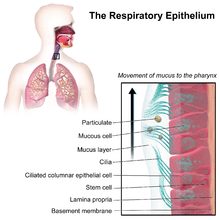Contents
Secretions and mucus
What are secretions and mucus?
The term secretion refers to the production of a substance by a tissue or gland.
In the human body, this term is mainly used to talk about:
- bronchopulmonary secretions
- vaginal secretions
- gastric secretions
- salivary secretion
The term mucus is, in medicine, preferred to that of secretions and it is more specific. By definition, it is a viscous, translucent secretion produced in humans by various internal organs or mucous membranes. Mucus is over 95% water, and it also contains large proteins, especially mucins (2%), which give it a viscous and insoluble consistency (resembling egg white). It also contains electrolytes, lipids, inorganic salts, etc.
Mucus is secreted in particular from the lungs, but also from the digestive system and the reproductive system.
The mucus plays a role of lubrication, humidification of the air, and protection, constituting an anti-infectious barrier. It is therefore a normal secretion, essential for the proper functioning of the organs.
In this sheet, we will focus on bronchopulmonary secretions and mucus, which are the most “visible”, especially in respiratory infection.
What are the causes of abnormal mucus secretion?
Mucus is essential to protect the bronchi: it is the first “barrier” against irritants and infectious agents, which continually enter our lungs during inspirations (at the rate of 500 L of breathed air per hour, we understand that there are many “impurities”!). It is secreted by two types of cells: the epithelium (surface cells) and the sero-mucous glands.
However, in the presence of infection or inflammation, mucus secretion may increase. It can also become more viscous and block the airways, interfering with breathing and causing a cough. Coughing can lead to coughing up mucus. Expectorated mucus is made up of bronchial secretions, but also secretions from the nose, mouth and pharynx. It contains cellular debris and microorganisms, which can change its appearance and color.
Here are some causes of bronchial hypersecretion:
- bronchitis
- secondary bronchial infections (complications of the flu, colds)
- asthma (exaggerated bronchial secretion)
- pulmonary edema
- smoking
- lung disease obstructive chronic or chronic obstructive pulmonary disease
- contact with air contaminants (dust, flour, chemicals, etc.)
- cystic fibrosis (cystic fibrosis), which is a genetic disease
- idiopathic pulmonary fibrosis
- tuberculosis
What are the consequences of excess mucus and secretions?
If the mucus is produced in too much quantity, it will interfere with gas exchange in the lungs (and therefore breathing), prevent the effective elimination of impurities and promote bacterial colonization.
Coughing usually helps clear excess mucus. The cough is indeed a reflex which aims to rid the bronchi, the trachea and the throat of the secretions which clutter it. We speak of productive cough or fatty cough when sputum is emitted.
When the sputum contains pus (yellow or greenish), it may be necessary to consult, although the color is not necessarily related to the presence of bacteria. On the other hand, the presence of blood should lead to an emergency consultation.
What are the solutions for excess mucus and secretions?
The solutions depend on the cause.
For chronic diseases such as asthma, there are well-codified, effective crisis and disease-modifying treatments that help control symptoms and lead a normal life, or almost.
In case of acute or chronic infection, especially bronchitis, antibiotic treatment may be necessary. In some cases, a drug to thin the secretions to facilitate their elimination may be recommended.
Obviously, if the bronchial hypersecretion is linked to smoking, only stopping smoking will calm the irritation and restore a healthy pulmonary epithelium. Ditto if the irritation is related to exposure to contaminants, for example in the workplace. In these cases, an occupational physician should be consulted to assess the severity of the symptoms and, if necessary, consider a change of job.
For more serious diseases such as chronic obstructive pulmonary disease or cystic fibrosis, pulmonary treatment by teams familiar with the disease will obviously be necessary.
Read also :What you need to know about asthma Our fact sheet on bronchitis Our fact sheet on tuberculosis Our fact sheet on cystic fibroma |










